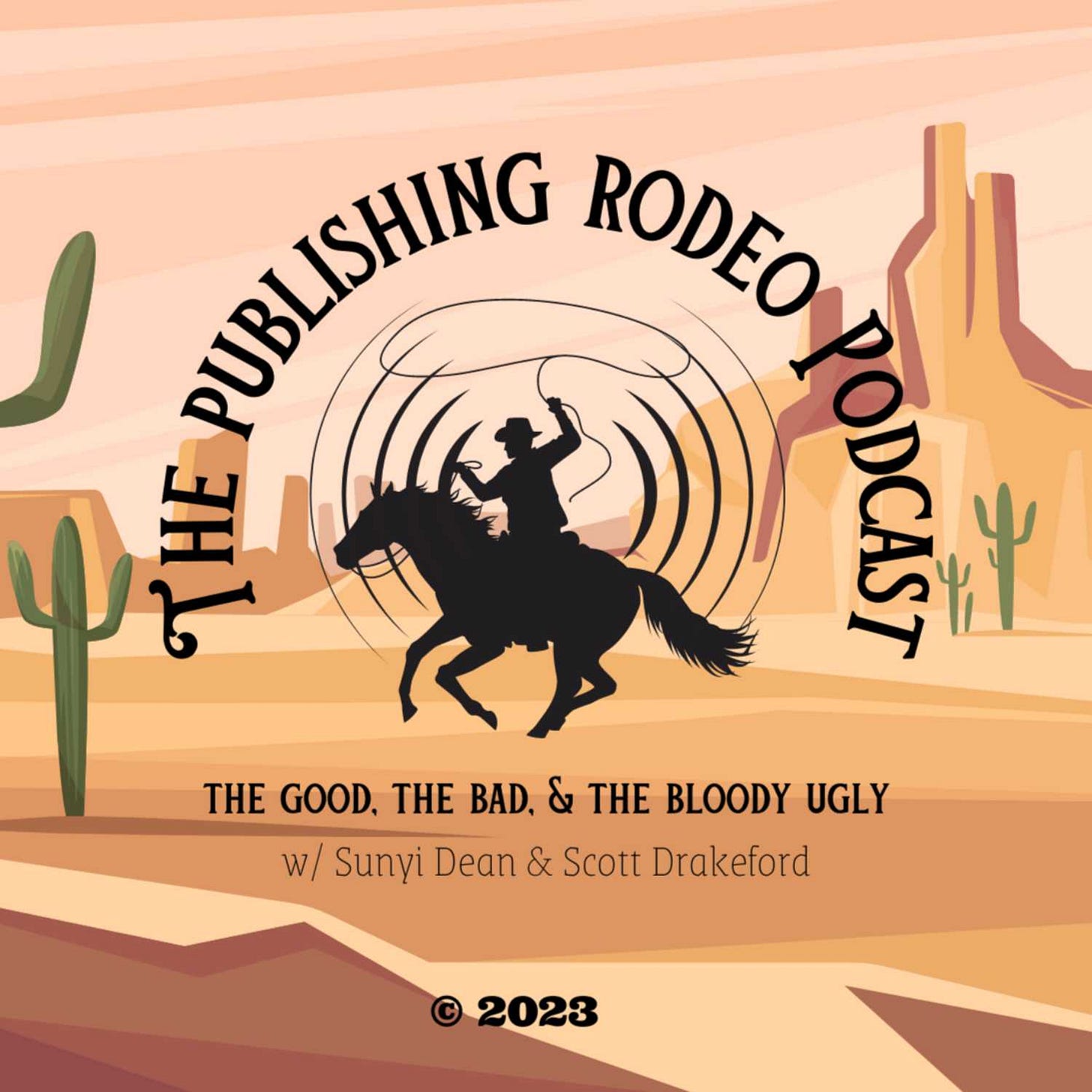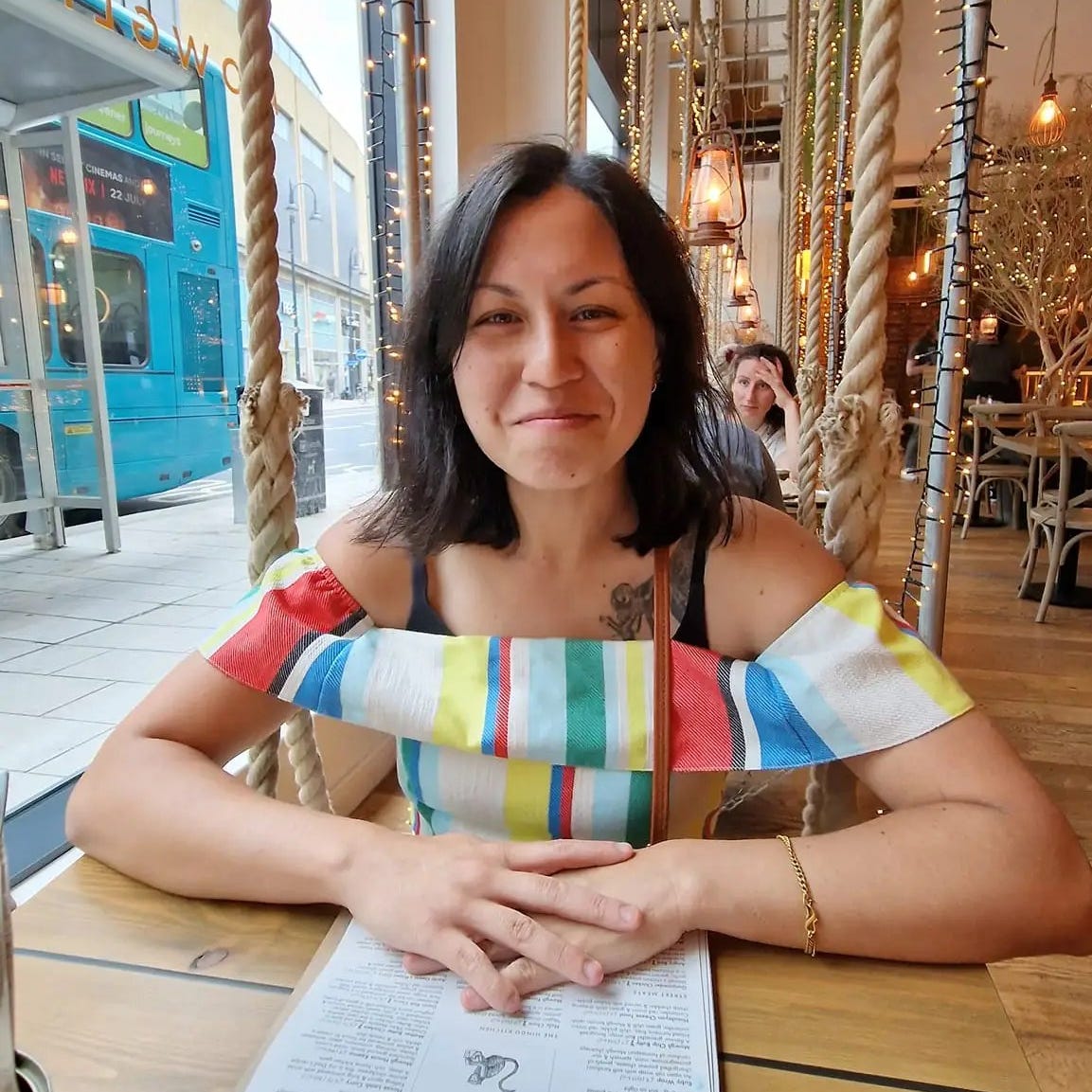Five Questions with Authors and Publishing Rodeo Hosts Sunyi Dean and Scott Drakeford
They take us behind the scenes of the publishing industry
Please note: an earlier version of this post used the phrase “front list” instead of lead title.
The Publishing Rodeo podcast, hosted by Sunyi Dean, author of The Book Eaters, and Scott Drakeford, who wrote Rise of the Mages introduced me to a new term: lead title.
Both Sunyi and Scott published their debut novels with Tor in 2022, but The Book Eaters was a lead title and Rise of the Mages was not. Sunyi received a $100,000 advance for her book, Scott got $10,000. Sunyi received cake pops to hand deliver to bookstores. Scott didn’t even get an audiobook. Sunyi hit the bestseller list, Scott did not. Their careers are now in very different places. On the podcast, they attempt to deconstruct their divergent experiences and what they tell us about the state of publishing.
I’ve become obsessed the behind-the-scenes nuggets Publishing Rodeo offers, so I was delighted when Sunyi and Scott agreed to an interview. Our conversation has been edited and condensed for clarity.
Scott is in the U.S. Sunyi is in the U.K. How did you two meet?
Scott: We were both Tor debuts, so I reached out in Twitter direct messages and said ‘Hey. Do you want to be friends?’
Sunyi: I started checking out the marketing his book would receive, just out of curiosity, and I thought, ‘Oh, they’re not going to treat this book very well.’ So, I started guiltily sharing his Twitter posts. Then he reached out to say hello.
Why’d you launch the podcast?
Sunyi: I listened to hundreds of hours of publishing podcasts in 2021. I was searching for discussions about the business of publishing and I was having trouble finding it. Sometimes people would talk about their journeys, but they weren't willing to give details about money.
When a friend sold her book, we wondered ‘Is this normal?’ When I got my book deal, I was struggling to contextualize what the money meant and what my career would look like.
Scott: I think it’s very clear that Sunyi is the genius behind the podcast.
I saw a huge discrepancy between what people in the industry say in public and what they say in private. As I went through my debut experience, I was given very little information from anywhere.
When I got in touch with Sunyi and the rest of the people in our writer group, it became obvious that there was information to be had out there, but in my opinion, it was hidden.
Scott, you said publishing information is “hidden.” Why do you think that is?
Scott: I’m going to preface this by saying I’m speaking for myself only.
On the author side, everybody has bought into the illusion of success. Nobody wants to admit the launch of their book went poorly because then it must be that your book sucked or you didn’t try hard enough. There’s a lot of indirect messaging from the industry that says you didn’t do enough as an author. And no one wants to admit that it didn’t go the way you want.
Very few are honest about how they’ve been treated by the industry, so publishers hide behind that message that the author didn’t do enough or ‘some books just don’t work.’ But they don’t have to account for the fact that they didn’t bother to do anything besides print these books and send them to bookstores.
Sunyi: It’s not malice so much as lack of awareness. I think editors sometimes lose sight of the author experience, especially if they’re not themselves authors. I found out recently that my editor listens to our podcast — which is a bit scary — and she was stressed because she didn’t realize authors thought it was that bad.
It’s easier for publishers to just not say things. In my experience, my publishers would tell me if something worked out, but I wouldn’t know they even tried if they didn’t succeed. They think that's a better way of handling it. But, people could cope a lot better with what happens in publishing if they knew what was going on.
You mentioned Sunyi’s editor listens to the show. What’s the response been?
Sunyi: We thought there’d be like 50 people who really like it, but we passed 40,000 downloads in May. Having launched in March, it’s crazy to me. A shocking number of industry people listen, which is a little bit scary.
Scott: It’s really bizarre. My book launched mostly to crickets after a decade of writing it and trying to get it published. Then on a whim, we just start talking about things that have happened. We don’t have crazy new data. We’re just being honest and it really resonated with people.
It’s almost good that we had low expectations going in because we may have censored ourselves a little more in the beginning if we knew who it would reach. We've set the tone now and there’s no going back.
Finally, any books you want to recommend?
Sunyi: I always recommend Essa Hansen’s books for sci-fi because they are something different and I don’t think they were marketed very well. She wrote the Nophek Gloss and the Graven trilogy which is all about multiverses, gender-fluid aliens and all kinds of fun things. Michael Mammay’s Generation Ship comes out soon and I genuinely loved it.
Scott: The one I’ll focus on today is Jeremy Greathouse’s The Hand of the Sun King, the first book in the Pact & Pattern series. It’s fantastic.
Thanks to Scott and Sunyi for chatting. You can follow Scott on Twitter and buy his book here. Sunyi is on Twitter and Instagram and The Book Eaters is available here. And, finally, check out Publishing Rodeo.
What to Read If is a free weekly book recommendation newsletter. Need a rec? Want to gush about a book? Reply to this email, leave a comment or find me on Twitter @elizabethheld.
If you’re reading this on Substack or were forwarded this email, and you’d like to subscribe, click the button below.
Disclosure: I am an affiliate of Bookshop.org and I will earn a commission if you click through and make a purchase.







So interesting!! In buying/bookselling we use the term “frontlist” somewhat differently — anything that is brand new/forthcoming. It’s not necessarily in opposition to midlist; when I talk to my sales reps, something could be midlist in terms of marketing and promo but still frontlist because it’s from the newest season of books. At the store we talk about the opposite of frontlist as “backlist,” which just means older. An author’s most immediate release from this season is frontlist and all their previous works are their backlist. Love these behind-the-scenes interviews, Elizabeth!
I’ve never heard midlist used this way! I’ve used it as an adjective to describe authors.... “the shrinking midlist” meaning the writers who could sell a new novel every couple of years that might tell tens of thousands of copies but wouldn’t hit the list. Now it’s blockbuster or bust.